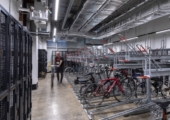January 18, 2024
British workers don’t want people to think of them as ambitious
 Ambition is a word now out of favour in the British workplace, according to Randstad’s latest global Workmonitor survey [registration] with workers in the UK less willing to describe themselves as ambitious than workers in other countries. The research, which surveyed 27,000 workers in 34 countries across Europe, Asia Pacific and the Americas, shows that while more than half (56 percent) of workers globally consider themselves to be ambitious, only 42 percent of workers in the UK do. Workers in other countries — including China (80 percent), Malaysia (73 percent), and India (90 percent) — are more likely to describe themselves as “having career ambition”. More →
Ambition is a word now out of favour in the British workplace, according to Randstad’s latest global Workmonitor survey [registration] with workers in the UK less willing to describe themselves as ambitious than workers in other countries. The research, which surveyed 27,000 workers in 34 countries across Europe, Asia Pacific and the Americas, shows that while more than half (56 percent) of workers globally consider themselves to be ambitious, only 42 percent of workers in the UK do. Workers in other countries — including China (80 percent), Malaysia (73 percent), and India (90 percent) — are more likely to describe themselves as “having career ambition”. More →



















 Gossiping at work can have serious negative impacts on your career, according to new research by Durham University Business School and NEOMA Business School. Not only are gossipers frowned upon by other work colleagues, they also become socially excluded in the company, and can experience negative career-related impacts as a consequence of their storytelling.
Gossiping at work can have serious negative impacts on your career, according to new research by Durham University Business School and NEOMA Business School. Not only are gossipers frowned upon by other work colleagues, they also become socially excluded in the company, and can experience negative career-related impacts as a consequence of their storytelling. 
 Proper management of employee health and wellness is an important facet to consider when striving for success in the workplace. Properly supporting employee health helps them perform better, encourages productivity, prevents losses from absences, enhances job satisfaction, and improves overall morale. Employers can promote employee wellness in different ways, but one area you should consider prioritising is eye care in the workplace.
Proper management of employee health and wellness is an important facet to consider when striving for success in the workplace. Properly supporting employee health helps them perform better, encourages productivity, prevents losses from absences, enhances job satisfaction, and improves overall morale. Employers can promote employee wellness in different ways, but one area you should consider prioritising is eye care in the workplace. 











January 22, 2024
London’s office market is reshaping the city and the way people experience the workplace
by Sam Mardon • Comment, Property